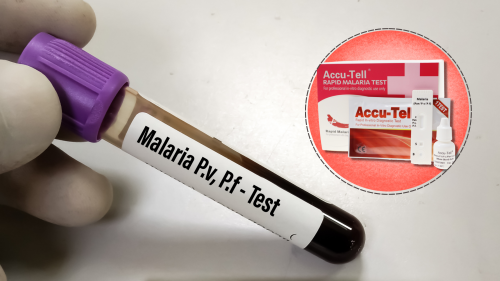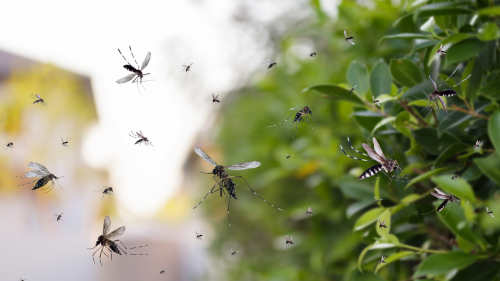Malaria, a parasitic disease caused by protozoa belonging to the genus Plasmodium. Despite being a preventable disease, cases reported among travelers have continued to increase in recent decades. So, for travellers it is important to know about the existent measures for malaria prevention.
Malaria is an acute parasitic disease of the tropics and subtropics, caused by the invasion and destruction of red blood cells by one or more of four species of the genus Plasmodium: P. falciparum, P. vivax, P. ovale, and P. malariae. All malaria parasite is transmitted by female Anopheles mosquitoes, which bite mainly between dusk and dawn.
The most severe form of human malaria is caused by P. falciparum, in which variable clinical features include spiking fevers, chills, headache, muscular aching and weakness, vomiting, cough, diarrhoea, and abdominal pain; other symptoms related to organ failure may supervene, such as acute renal failure, generalised convulsions, and circulatory collapse, followed by coma and death.
The risk for travellers of contracting malaria varies greatly from country to country and even between areas within a country. There is usually less risk at altitudes above 1500 m, although in favourable climatic conditions the disease can be contracted at altitudes up to almost 3000 m. The risk of infection may also vary according to the season, being highest at the end of, or soon after, the rainy season.
Education and health promotion regarding the risk of malaria infection and prevention efforts should be given to travelers who will travel to endemic areas. Travellers should note the five principles of malaria protection:
- Be aware of the risk, the incubation period, the possibility of delayed onset, and the main symptoms
Most travelers are considered non-immune to malaria and symptomatic disease is therefore seen across all age groups. The incubation period is of approximately 2 weeks for malaria caused by P. falciparum, P. knowlesi, and P. vivax. For P. ovale and P. malariae, the incubation period is of about 2–3 weeks and 18–35 days, respectively. Symptoms that usually occur are fever (≥ 37,5 °C), chills, sweating and can be accompanied by headaches, nausea, vomiting, diarrhea and muscle aches. The main symptoms are often associated with other diagnoses of infection: such as typhoid fever, dengue fever, leptospirosis, chikungunya, and respiratory infections.
Therefore, a definite diagnosis of malaria must be established by microscopic examination of the blood smear or rapid diagnostic test (Rapid Diagnostic Test = RDT). The mechanism of action of RDT is based on the detection of malaria parasite antigens, using the immunochromatographic method.
One of the products to perform RDT malaria is ACCU-TELL® Malaria P.f./P.v./Pan Cassette (Whole Blood).

Picture 1. ACCU-TELL® Malaria P.f./P.v./Pan Cassette (Whole Blood)
ACCU-TELL® Malaria P.f./P.v./Pan Cassette (Whole Blood) can provide results in just 10 minutes using a whole blood sample. With the results of clinical trials; Sensitivity P.f. >99.9%, Sensitivity P.m. 98%, Specificity 99.9%, Accuracy 99.8%, indicating that ACCU-TELL® Malaria P.f./P.v./Pan Cassette (Whole Blood) can detect well the presence of plasmodium antigen in whole blood.
- Avoid being bitten by mosquitoes, especially between dusk and dawn
All travellers should be advised that personal protection from mosquito bites between dusk and dawn is their first line of defence against malaria. Travellers may protect themselves from mosquitoes by the means outlined in the following:
- Choose a repellent containing DEET to applied to exposed skin or to clothing to prevent vector contact. Repeated applications may be required every 3–4 h, especially in hot and humid climates when sweating may be profuse
- Mosquito nets are excellent means of personal protection while sleeping. Nets should be tucked in under the mattress, ensuring first that it is not torn and that there are no mosquitoes inside
- Use mosquito coils or vaporizer
- Spraying aerosol to kill flying insects, and sleeping areas should be sprayed before bedtime. Spraying before bedtime, combined with the use of a vaporizer or a mosquito net, is recommended
- Use protective clothing can help at times of the day when vectors are active. The thickness of the material is critical. Insect repellent applied to clothing is effective for longer than it may be on the skin. In tick- and flea-infested areas, feet should be protected by appropriate footwear and by tucking long trousers into the socks

Picture 2. Illustration
- Take antimalarial drugs (chemoprophylaxis)
Chemoprophylaxis is one way to reduce the risk of fatal malaria by administering antimalarial drugs with the right regimen, dosage, and duration. Regulations in Indonesia, quoted from the Ministry of Health's Handbook for Malaria Case Management, the drug used for chemoprophylaxis is doxycycline at a dose of 100 mg/day. This drug is given 1-2 days before traveling, while in the area until 4 weeks after returning.

Picture 3. Doxycycline
The price of doxycycline is relatively cheaper. This drug can also provide a preventive effect against other infections, such as Rickettsia and leptospirosis so that it can be used for those who plan to do outdoor activities, such as hiking, camping, and swimming in rivers or lakes. But doxycycline should not be given to pregnant women and children under 8 years of age and should not be given for more than 6 months.
- Immediately seek diagnosis and treatment if a fever develops 1 week or more after entering an area where there is a malaria risk and up to 3 months after departure from a risk area
A person who experiences a fever 1 week or more after entering an area with malaria risk should consult a physician or qualified malaria laboratory immediately to obtain a correct diagnosis and safe and effective treatment. In principle, travellers can be treated with an ACT (Artemisinin Combination Therapy) in accordance with the national policy in the country they are visiting. National antimalarial drug policies for all countries/territories with risk are available from the WHO website.
- Avoid outdoor activities in environments that are mosquito breeding places, such as swamps or marshy areas, especially in late evenings and at night
The prevention of malaria in travelers continues to be challenging. A multitude of factors determine the risk of malaria acquisition among travelers. The knowledge of such factors and the available preventive measures are of vital importance in being able to travelers.
References:
- KEMENKES RI. (2017). Buku Saku Penatalaksanaan Kasus Malaria
- National Center for Biotechnology Information. (2021). An update on prevention of malaria in travelers
- World Health Organization. (2020). Malaria: International Travel and Health




